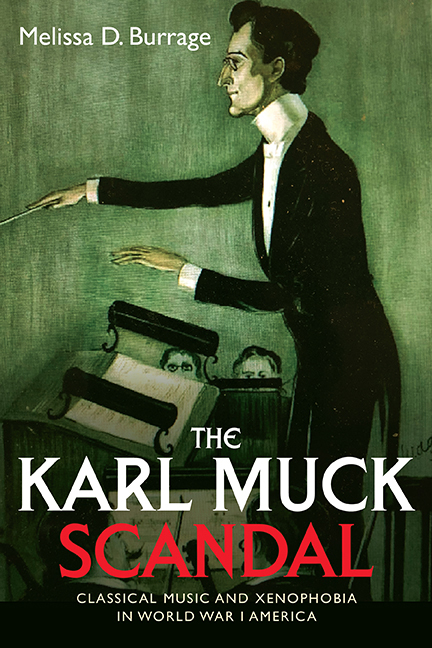Book contents
- Frontmatter
- Dedication
- Contents
- Introduction
- 1 Here on Foreign Shores: Dr. Karl Muck's Acclaim in Boston (1906–1918)
- 2 Mobilization: A Changing Environment for Boston (1917)
- 3 Selling the War: Demonizing the Enemy (1918)
- 4 “Looking for the Trump Card”: Mrs. William Jay's Attacks on Karl Muck in Wartime America (1915–1918)
- 5 “A Leaf in the Storm”: Muck, Higginson, and the Boston Symphony Orchestra (1918–1919)
- 6 Muck's Arrest: “Finding ‘One Weak Spot’” (1918–1919)
- 7 “Only Too Proud to Shoulder It All”: The Sexual Climate of Wartime Boston and Muck's Fall from Grace (1918–1919)
- 8 Muck's Final Years: His Association with the Wagners and Adolf Hitler (1920–1940)
- Coda (1919 to Present)
- Acknowledgments
- Notes
- Bibliography
- Index
- Eastman Studies in Music
2 - Mobilization: A Changing Environment for Boston (1917)
Published online by Cambridge University Press: 06 September 2019
- Frontmatter
- Dedication
- Contents
- Introduction
- 1 Here on Foreign Shores: Dr. Karl Muck's Acclaim in Boston (1906–1918)
- 2 Mobilization: A Changing Environment for Boston (1917)
- 3 Selling the War: Demonizing the Enemy (1918)
- 4 “Looking for the Trump Card”: Mrs. William Jay's Attacks on Karl Muck in Wartime America (1915–1918)
- 5 “A Leaf in the Storm”: Muck, Higginson, and the Boston Symphony Orchestra (1918–1919)
- 6 Muck's Arrest: “Finding ‘One Weak Spot’” (1918–1919)
- 7 “Only Too Proud to Shoulder It All”: The Sexual Climate of Wartime Boston and Muck's Fall from Grace (1918–1919)
- 8 Muck's Final Years: His Association with the Wagners and Adolf Hitler (1920–1940)
- Coda (1919 to Present)
- Acknowledgments
- Notes
- Bibliography
- Index
- Eastman Studies in Music
Summary
International Tensions and the Road to War
On June 28, 1914, news of the assassination of heir to the Austro- Hungarian throne Archduke Franz Ferdinand and his wife Sophie Chotek by Bosnian Serb Gravrilo Princip, ended peace in Continental Europe and led to the start of the world's first global war thirty-seven days later. With the death of one world leader, a veritable perfect storm of circumstances was unleashed, including a deadly series of political alliances arranged in the policy-making centers in Germany, Austro- Hungary, France, Russia, Britain, Italy, the Ottoman Empire, and the Balkan states, involving complex interactions between kings, emperors, foreign ministers, presidents, ambassadors, and military commanders who viewed the world through fearful and paranoid eyes. The world became embroiled in battle, pitting heavily armed country against country and neighbor against neighbor, changing history irrevocably.
World War I scholars continue to debate the origin of the conflict, giving rise to an enormous body of historical literature with a wide array of hypotheses and interpretations. With an overabundance of sources, or missing archival materials, and with so many factors shaping the decisions that led to war, historians are perhaps no closer to understanding how this worldwide catastrophe came to be.
The events that unfolded in Boston, and for Karl Muck more specifically, were the local consequences of a vast, global struggle for power taking place at the dawn of the twentieth century, as empires rose and fell, and as political tensions increased. The German Empire was one of those rising nations officially unifying following its victory in the Franco-Prussian War in 1871. Under the leadership of Minister President of Prussia Otto von Bismarck (1862–90), who had been appointed by Kaiser Wilhelm I, Germany rapidly emerged as an industrial powerhouse, and the nation soon became a byword for remarkable productivity and economic expansion. Ultimately, Germany would eclipse the British Empire to become the leading economic force in Europe.
Changing power relations throughout the continent caused diplomatic instability in the final decades of the twentieth century. Under Bismarck's leadership, Germany had remained at peace. When Wilhelm I died in 1888, however, and his successor, Wilhelm II, ascended to the throne, Bismarck was dismissed, and the intricate web of peacebuilding alliances with neighboring nations that he had negotiated fell apart.
- Type
- Chapter
- Information
- The Karl Muck ScandalClassical Music and Xenophobia in World War I America, pp. 67 - 87Publisher: Boydell & BrewerPrint publication year: 2019



